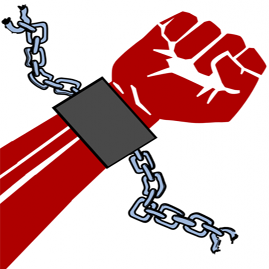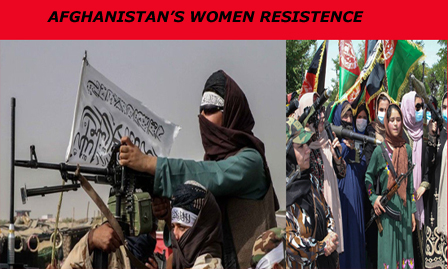| |
CLICK HERE ON HOW TO READ
THE BELOW (updated 12 MAR 2022)
When one hurts or kills a women
one hurts or kills hummanity and is an antrocitie.
Gino d'Artali
and: My mother (1931-1997) always said to me <Mi
figlio, non esistono notizie <vecchie> perche puoi imparare qualcosa da
qualsiasi notizia.> Translated: <My son, there is no such thing as so
called 'old' news because you can learn something from any news.>
Gianna d'Artali
The Guardian
25 May 2022
Supported by
guardian.org
<<Rights and freedom
India]Interview
‘To survive, I must appear fearless’: the former nun helping India’s
garment workers fight sexual violence.'
By Annie Kelly
Many years ago, when Thivya Rakini was working as a domestic violence
activist helping women to escape abusive husbands across the southern
Indian state of Tamil Nadu, she took a pair of scissors and cut her long
black hair back to the nape of her neck. <Without my hair, I suddenly
looked very frightening to a lot of people who couldn’t believe a woman
would cut away her femininity like that,> she says. <I was sending a
signal that that those men shouldn’t try to mess with me. Inside, I am
really a very tender-hearted person but to survive I have learned that I
must appear fearless.>
Rakini – a former nun, divorcee, domestic violence survivor and now
union leader – has done a lot with her 42 years. She smashed cultural
taboos and became a social pariah for choosing to leave her marriage and
bring up her son as a single mother in a remote part of a deeply
traditional and caste-bound state. Now, in her role as president of the
Tamil Nadu Textile and Common Labour Union (TTCU), Tamil Nadu’s only
female-led garment workers union, she has turned her attention to the
multibillion-pound global fashion industry. Such is her reputation
locally that, despite her hair growing long again, her appearance is
often enough to strike fear into the hearts of garment factory owners
across the Dindigul district of Tamil Nadu where the TTCU is based.
<When they see me, they turn pale and run inside,> she laughs. <They
tell their workers: ‘Don’t you be talking to her – she’s trouble.’ They
try to shut their gates against me but I’ll always find a way in if
there are women inside that need our help.> Since 2015, Rakini and the
TTCU have been fighting what she describes as a “plague” of rape,
harassment and sexual violence that has infested global garment supply
chains and is being perpetrated on poor women making clothing destined
for high streets across the UK. <As a woman, everything I have done with
my life is a source of shame to someone,> she says. <But it has given me
freedom to fight on issues such as gender-based violence that are still
covered in silence and stigma. I am not afraid to take it out of the
shadows and say: 'This is wrong.'> Tamil Nadu, a major centre of Indian
textile production, is one of the country’s economic powerhouses and
home to tens of thousands of garment factories and cotton mills. It is
also notorious for the poor wages and bleak conditions imposed on its
largely female workforce. When Rakini joined the TTCU in 2014, it was a
nascent organisation with just a few union leaders trying to help women
organise and call for better conditions in their factories. She came on
board to help deal with the huge levels of domestic violence that
workers were facing. The union office soon become a makeshift shelter
for women and their children who had nowhere else to go. <At that time,
we were blocked from most workplaces because many factories didn’t allow
workers to join unions and the unions that were active were all run by
men,> says Rakini. <Yet women suffering from domestic violence were also
telling us about the terrible things they were experiencing in the
workplace at the hands of their supervisors and male employees. So it
became our mission to try and put a stop to this.> In her seven years at
the TTCU, Rakini has seen enough to pour scorn on the insistence of many
global fashion brands that they do everything in their power to protect
the millions of poor black and brown women working in garment supply
chains. <The truth is that sexual harassment, rape, even murder has
become part and parcel of the lives of women working in garment
factories in my district,> she says. <International brands who buy from
Tamil Nadu know very well that women in their supply chains are
exploited to the core, they know the impact that their production
targets and their poverty wages have on the workers' lives. Their
auditors know their inspections are meaningless. Their whole system is a
lie.> The TTCU began taking on cases of sexual harassment and abuse that
none of the larger unions would touch. <In those factories, the women
have no power. They are often the main breadwinners for their family and
although their pay is meagre, they must keep their jobs at all costs.
They feel they have to do whatever their bosses demand of them,> Rakini
explains. <When we first started going to the factories to complain, the
management would just kick us out. They didn’t care.> >>
Read more here:
https://www.theguardian.com/global-development/2022/may/25/to-survive-i-must-appear-fearless-the-former-nun-helping-indias-garment-workers-fight-sexual-violence
The Guardian
22 May 2022
The Observer
Amber Heard
#MeToo is over if we don’t listen to ‘imperfect victims’ like Amber
Heard.
By Martha Gill
<<The backlash to the #MeToo movement was always coming. We know this
because a backlash has followed every single step forward feminists have
ever made. This backlash was always going to be big, too. Not only did #MeToo
threaten a status quo that props up powerful men, it threatened these
men personally, and – as it seemed to some – with reckless caprice. <If
somebody can be brought down by accusations like this,> a White House
lawyer said shortly after Christine Blasey Ford’s allegations against
Brett Kavanaugh were made public, <then you, me, every man certainly
should be worried.> It wasn’t just men who were worried. The idea that
systems that previously treated only women, minorities and lower-class
men unfairly might be capable of doing the same to high-status men was
deeply unsettling to everyone. After all, when a man is treated badly it
lands with a double sense of burning injustice. Women’s stories of woe
are so common that they can leave us comparatively unfazed. We feel bad,
but we already know women are treated unfairly. It is priced in.
<[Women’s stories were] all the same story, which is not to say it
wasn’t important. But it was boring,> writes Taffy Brodesser-Akner in
her novel Fleishman Is in Trouble. <The first time I interviewed a man,
I understood we were talking about something more like the soul.> When
something bad happens to a powerful man, it has not happened to a
statistic. It has happened to a human soul. For these reasons, #MeToo
struck many men – and women – as deeply unfair. Yet it was merely an
attempt to correct a bias that still exists. Female accusers are still
routinely treated as if they are lying, both by the public and the
courts – more so than other alleged victims of crime. It took the
testimony of more than a hundred women to bring down Harvey Weinstein.
Brett Kavanaugh was not brought down.>>
Read more here:
https://www.theguardian.com/commentisfree/2022/may/22/metoo-is-over-if-we-dont-listen-to-imperfect-victims-like-amber-heard
The Guardian
22 May 2022
Supported by
guardian.org
By Annie Kelly
<<Murder, rape and abuse in Asia’s factories: the true price of fast
fashion.
Jeyasre Kathiravel had always dreamed of a life beyond the garment
factories of Dindigul, a remote corner of the southern Indian state of
Tamil Nadu. Despite the meagre wages she was earning – about £80 a month
– Kathiravel knew she was lucky to have a job at Natchi Apparels, a
local factory making clothes for H&M and other international brands.
Like many Dalit women in her community, a job at the factory had
provided her family with a stable salary. Yet she wanted more. So, with
dreams of escaping the deprivation and caste discrimination that had
stalked her family for generations, the 20-year-old studied for the
civil service exams by night before leaving her home each morning to
work long shifts sewing clothes for other, luckier, young women
thousands of miles away. Kathiravel never escaped the factory floor. On
1 January 2021, she failed to return home from work. Despite her
family’s frantic attempts to find her, four days later her decomposing
body was discovered by farmers just a few miles from her village. When
her supervisor, a man named by Indian media as V Thangadurai, was
arrested for her murder, few of her intimate circle were surprised.
Thangadurai has since been charged with her murder and is in jail
awaiting trial. For months before Kathiravel’s death, her family and
co-workers say that Thangadurai was perpetrating a relentless campaign
of sexual harassment towards her, which she felt powerless to report or
stop. <She said this man was torturing her but she didn’t know what to
do because she was so scared of losing her job,> says her mother,
Muthuakshmi Kathiravel.
<She was such a good girl, she was the best of all of us. She was always
helping me and supporting the family, but wanted to do different things
with her life.> Workers at Natchi interviewed by the Observer in the
weeks after her murder say Thangadurai was known to be a sexual predator
operating with impunity at the factory. <We all knew what he was doing
to Jeysare but nobody in management cared,> says one woman who worked
alongside Kathiravel. <If she complained she was scared she would lose
her job or that men from the factory would visit her family and say she
was a troublemaker.>
A year later, Kathiravel’s family are still deep in grief. In their
home, Kathiravel’s face smiles down at them from a photo on the wall and
they say they can never fill the hole she has left behind. Yet they now
believe her death has not been in vain.>>
Read more here:
https://www.theguardian.com/global-development/2022/may/22/murder-rape-and-abuse-in-asia-factories-the-true-price-of-uk-fast-fashion-jeyasre-kathiravel
|



